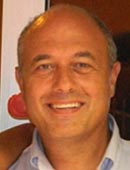Massimo Conese (Italian, born 6 August 1961) is full professor in General Pathology and the Director of the Laboratory of General Pathology at the University of Foggia, Italy. Previously, he was research assistant at the Telethon Institute for Gene Therapy (1997-2001) and group leader of the Institute for Experimental Treatment of Cystic Fibrosis (2001-2007), H. S. Raffaele, Milan, Italy.
He has a degree in Medicine and Surgery and holds a Specialization in Oncology and a doctoral degree in Cellular and Molecular Biology and Pathology.
He was appointed Coordinator in the European Community (EC) project (FP5) “Development and application of chromosome-based gene transfer vectors for cell therapy” (2003-2006) and was Partner in two EC projects (FP6) “Improved precision of nucleic acid based therapy of cystic fibrosis” (2005-2008) and “European Coordination Action for Research in Cystic Fibrosis” (2005-2009).
He has received research funding from Telethon Italy, Italian Ministry of Education and University (PRIN), Italian Foundation for the Research in Cystic Fibrosis, Regione Apulia, Italy, and the European Union—NextGenerationEU through the Italian Ministry of University and Research under PNRR.
His research focus is situated in the fields of:
Pathophysiology, gene/cell therapy, and drug delivery applied to Cystic Fibrosis: Characterization and inflammatory potential of microparticles from sputum of patients with cystic fibrosis; Interaction between CFTR, NHERF1, actin cytoskeleton and tight junctions in polarized models of airway epithelial cells; Study of the pro-inflammatory potential of airway epithelial cells by evaluation of NF-κB activation and chemokine and cytokine secretion in vitro; Host-pathogen interaction between Pseudomonas aeruginosa and Burkholderia cepacia and respiratory epithelial cells in in vitro and in vivo models (fetal respiratory xenografts, acute and chronic respiratory infection in the mouse); Regulation of the epithelial sodium channel ENaC by lentivirus-mediated RNA interference in airway epithelial cells in vitro; Homing, differentiation and mitochondrial content of hematopoietic stem cells in in-vitro and in-vivo models; Human amniotic mesenchymal stromal cells for the correction of the basic defect in cystic fibrosis in in vitro models of polarized airway epithelium; Discovery of biomarkers linked to inflammation in patients treated with antibiotics and new small molecule drugs; Evaluation of mucopenetrating drug delivery systems for anti-inflammatory properties in ex-vivo models of airway epithelial cells.
Nanoparticle-mediated drug delivery: in vitro and in vivo delivery of heparin, beclomethasone, curcumin and dopamine through solid lipid nanoparticles, conjugates of chitosan, liposomes, and hydrogels, to airway epithelial cells and brain cells.
Isolation, characterization, and biological effects evaluation of plant-derived vesicles: anti-proliferative and anti-oxidant activities of broccoli-derived nanovesicles; wound healing effects of tomato-derived nanovesicles.
Role of the Insulin-like Factor Binding Protein (IGFBP-6) in immunity: study of its expression and function in monocyte-derived dendritic cells, monocytes, neutrophils, T and B cells.
Stem cell-based therapy for wound healing: Differentiation capacities of human adipose-derived stem cells, either cultured or in stromal-vascular fraction, in standard culture conditions and in glycosaminoglycan scaffolds.
He is author of more than 180 publications in international peer-reviewed journals (h-index in Scopus 42) and has published 15 chapter books. He is Editorial Board Member of Open Medicine, Current Stem Cell Research & Therapy, Case Reports in Medicine, International Journal of Molecular Sciences, Journal of Respiration, Pathophysiology. He has served as an ad hoc reviewer for the Swiss National Science Foundation, the UK Medical Research Council, the UK CF Trust, and the Irish Health Research Board.
He has been invited as a speaker at more than 100 national and international conferences on coagulation, fibrinolysis, gene therapy, cystic fibrosis, cell therapy, stem cells, regenerative medicine, and wound repair.
